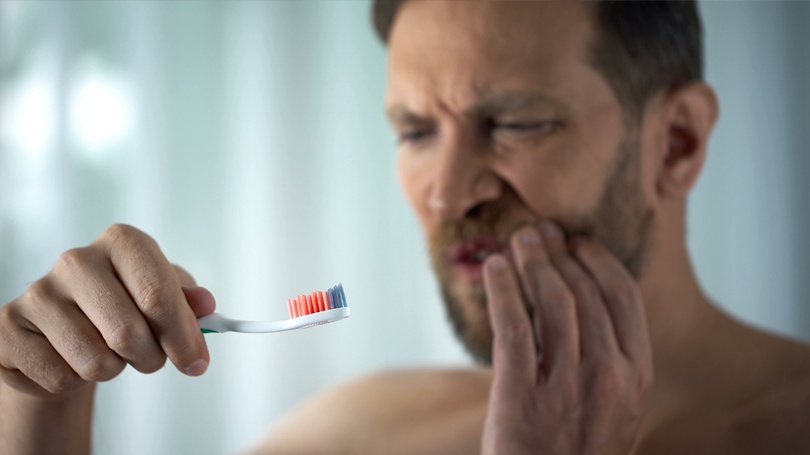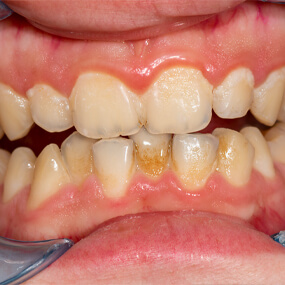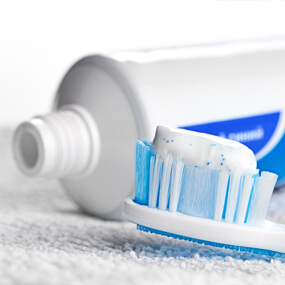How Gum Disease Can Exacerbate COVID-19 and Other Medical Conditions

As COVID-19 data has accumulated, a relationship between the virus and a number of other medical conditions has been revealed. One recent study found a correlation between gum disease and severe negative outcomes for patients with the virus. To appreciate this connection, it is necessary to understand what gum disease is and how it affects the body in a systemic capacity.
Periodontal disease is the inflammatory response to a gum infection. It undermines not just the soft gum tissue but the supporting bone as well. It differs from tooth decay in this way. Whereas tooth decay causes holes in the teeth, gum disease causes holes in the bones that support the tooth roots. Gum disease is a serious problem estimated to affect 90 percent of the population. The primary cause of the condition is inadequate oral hygiene at home and failure to see a dentist on a regular basis.
If you experience a bacterial infection, your body responds with inflammation. This is known as a cytokine response. Cytokines are proteins released by the body to coordinate the fight against the infection. These cytokines are integral to the function of the human body, but in certain scenarios, such as the seasonal flu, a feedback loop can occur in which too many cytokines are produced. This situation is often referred to as a cytokine storm and can be very dangerous because these inflammatory agents can get into the bloodstream and cause damage to organs elsewhere throughout the body.
The California Dental Association published a study in October 2020 that posited the theory that patients with COVID-19 who had preexisting periodontal disease were at greater risk of respiratory failure. Research within that study indicated that bone loss and other symptoms associated with chronic periodontitis could cause severe virus complications. These patients had more inflammatory agents in their bloodstreams and were, therefore, at greater risk of damage to their lungs. That damage could lead to lung failure, which would then require that the patient be put on a ventilator to survive.
While such research related to COVID-19 is still in the early phases, there is a wealth of research linking gum disease to other serious health conditions, such as diabetes. People with diabetes are more prone to gum disease, and their risk is particularly great if the diabetes is not controlled. The relationship between diabetes and gum disease is bidirectional. In other words, they exacerbate one another. Gum disease can make diabetes harder to control, and uncontrolled diabetes can make gum disease harder to treat or manage. Not surprisingly, diabetes is also recognized as a health condition that can trigger severe COVID-19 outcomes.
Other studies have linked periodontal disease to:
- Low birth weight
- Preterm deliveries
- Pulmonary disease
- Alzheimer’s disease
- Cardiovascular diseases
- Kidney, pancreatic, and other cancers
All people are susceptible to periodontal disease to some degree. However, certain groups are at greater risk than others. Data shows that people age 65 and up are at greater risk of more serious gum disease and that Hispanic and African American populations are at greater risk in general.
Prevention is crucial in the battle against periodontal disease. While early gum disease—gingivitis—is reversible, periodontal disease is not. It can only be managed. Therefore, it is important to brush and floss on a daily basis and to see your dentist biannually, at least. Patients with gum disease may need to see their dentist even more often or go to a specialist, known as a periodontist.
Regular Dental Visits Are Crucial
A common mistake people make is only going to the dentist as a reaction to an apparent problem. But when it comes to oral health, prevention is superior to a cure on a number of fronts. Prevention is less expensive and less invasive, and it avoids the ancillary damage that can occur. Your dentist can identify the signs of an oral health problem long before those issues manifest as tangible damage.
While regular brushing and flossing at home are important, it is practically impossible to get all the plaque and tartar that can accumulate. A routine dental visit usually involves a cleaning. An oral hygienist will scale and polish your teeth in order to ensure that all substances that encourage tooth decay and gum disease are removed. After having your teeth cleaned, your dentist will examine all aspects of your mouth and may make recommendations concerning your oral hygiene routine.
Schedule Your Cleaning and Checkup Today
Keeping your teeth and gums clean and healthy is always important, but it may be even more crucial during this time when COVID-19 presents such great risk. Jeffrey D. Clark, DDS, is accepting new patients. If you are new to the area or want a fresh start, we encourage you to schedule a cleaning and checkup. You can do so with the peace of mind that Scottsdale Cosmetic Dentistry Excellence has implemented additional hygiene and sanitation measures in response to COVID-19. We have adhered to all guidelines set forth by the ADA, Arizona Dental Association, CDC, and OSHA. Call our office today at 480 585 1853 with any questions and to schedule your appointment.




